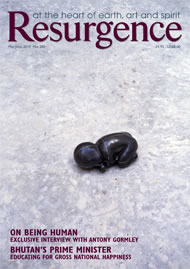Don’t let the rambling lower-case title put you off this book, for it is a marvellous attempt to weave together concerns, ideas and change-making efforts from across the globe, to make the world saner, “well-thier” and sustainable. The ‘bazaar’ – the traditional and more humane, decentralised, local, face-to-face market system – is the author’s metaphor for both a lost ‘agora’ and future world-wide-web-inspired alternatives.
This book is the result of the kind of enormous effort one recognises when shown a beautifully woven sari in an Indian bazaar. To carry the sari analogy further, the book’s warp consists of important questions like: Is it realistic to assume that the common good will be ensured by everyone seeking their individual gain? Can we create ecological economic systems? Can we continue to let utility and wealth obscure freedom and justice? Can we expect the free-market mechanism to actually be fair? Can we create a better balance between the competing human tendencies of greed and generosity, competition and co-operation, conflict and conciliation, self-interest and the welfare of others? Or, as economist Jeremy Rifkin puts it, “Can civilisation (and we can add, life on Gaia itself) survive when only the commercial sphere is left as the primary mediator of human (and planetary) life?” Meanwhile, the weft of this ambitious book comprises stories of the many people who are creating new visions, systems, values and institutions that attempt to answer these questions by providing inspiring alternatives.
Primarily, Rajni Bakshi suggests a vision for a socially embedded market culture – a market economy but not a market society: the creation of a “mindful market” culture (activist David Korten’s term), that has the best of market efficiency but is more attuned to social, ecological and moral responsibility.
In developing this woven vision, Bakshi skilfully employs a palette of issues, ideas and innovators. To mention a few: the mis-understandings and misperceptions of the work of social philosophers like Adam Smith and scientists like Charles Darwin in the emergence of neo-liberal economics; pioneers of alternative economics like E. F. Schumacher, Hazel Henderson, Amartya Sen, Muhammad Yunus, Ray Anderson, George Soros, Robert Kuttner, Herman Daly, Joseph Stiglitz, Ela Bhatt, Eisuke Sakakibara; the worldwide web, its emerging culture and its pioneers like Tim Berners-Lee and Linus Torvalds and what Bakshi sees as its societal possibilities for commerce and interactions. (The internet seems to be her new ‘bazaar’, and she even writes with some enthusiasm of a new ‘operating system’ for the market.)
While there is much value in the enormous swathe of ground Bakshi covers, I think she may have packed a bit too much into this book – perhaps her sari would have been more compelling if she had adorned it less. She could have had less history and greater exploration of the redemptive possibilities of a web-based society and its impact on conversation, freedom and commerce; and its enablement of a market economy with greater interdependence, decentralisation and democracy. But perhaps this will be her next book.
Yet Bakshi is careful not to suggest any grand design. The enormity of the changes that are needed globally is daunting, and she, as many of her exemplars, is undecided as to whether this can be pulled off. Only gently does she suggest that sustainability and happiness may require a new enlightenment that includes the practice of Gandhian simple living, a Vedantic and Buddhist understanding of desire management and a re-acculturation of the Mind – of what to value and what choices to make. Personally, I think she is spot on. We are in the midst of an enormous struggle for both a system redesign and re-acculturation – and they must happen together.
I was reading this book on 15th August (India’s Independence Day), when Prime Minister Manmohan Singh declared that the most important challenge India faced was achieving 9% GDP growth. Ouch! I strongly recommend this book to him, suggesting that he at least heed the caution of Simon Kuznets (the ‘father of GDP’) that “the welfare of a nation can scarcely be inferred from a measurement of national income as defined by GDP”, and look at the many alternatives in this book for a different model and measure of progress. I would also recommend this book to Gordon Brown, Barack Obama and their teams.
Bakshi has chosen to be an amplifier of the work of the many people she has met and researched, which is a significant contribution. And she reminds us, as Dee Hock, creator of the Visa system, put it, “It is too late and things are too bad for pessimism. One must try!”







